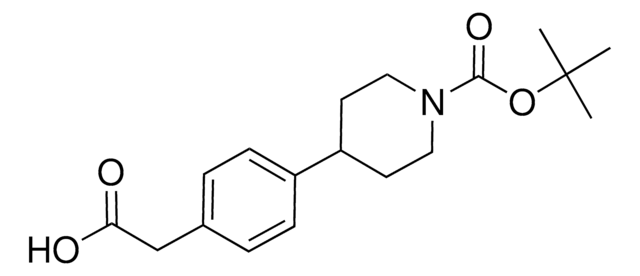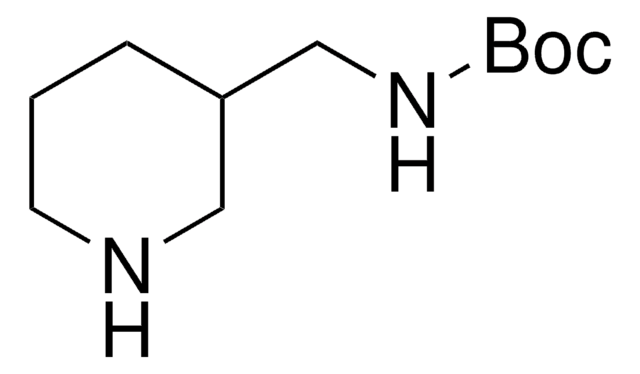Wichtige Dokumente
916870
4-(1-(tert-butoxycarbonyl)piperidin-4-yl)benzoic acid
≥95%
Synonym(e):
Semi-flexible linker for PROTAC® development
About This Item
Empfohlene Produkte
Qualitätsniveau
Assay
≥95%
Form
powder
Eignung der Reaktion
reagent type: linker
Funktionelle Gruppe
Boc
carboxylic acid
Lagertemp.
2-8°C
SMILES String
O=C(N(CC1)CCC1C(C=C2)=CC=C2C(O)=O)OC(C)(C)C
InChI
1S/C17H23NO4/c1-17(2,3)22-16(21)18-10-8-13(9-11-18)12-4-6-14(7-5-12)15(19)20/h4-7,13H,8-11H2,1-3H3,(H,19,20)
InChIKey
YCNVQGGUCDVTIZ-UHFFFAOYSA-N
Anwendung
Sonstige Hinweise
Rechtliche Hinweise
Ähnliches Produkt
Signalwort
Warning
H-Sätze
Gefahreneinstufungen
Aquatic Acute 1 - Aquatic Chronic 1 - Eye Irrit. 2 - Skin Irrit. 2 - Skin Sens. 1
Lagerklassenschlüssel
11 - Combustible Solids
WGK
WGK 3
Flammpunkt (°F)
Not applicable
Flammpunkt (°C)
Not applicable
Hier finden Sie alle aktuellen Versionen:
Analysenzertifikate (COA)
Die passende Version wird nicht angezeigt?
Wenn Sie eine bestimmte Version benötigen, können Sie anhand der Lot- oder Chargennummer nach einem spezifischen Zertifikat suchen.
Besitzen Sie dieses Produkt bereits?
In der Dokumentenbibliothek finden Sie die Dokumentation zu den Produkten, die Sie kürzlich erworben haben.
Unser Team von Wissenschaftlern verfügt über Erfahrung in allen Forschungsbereichen einschließlich Life Science, Materialwissenschaften, chemischer Synthese, Chromatographie, Analytik und vielen mehr..
Setzen Sie sich mit dem technischen Dienst in Verbindung.










